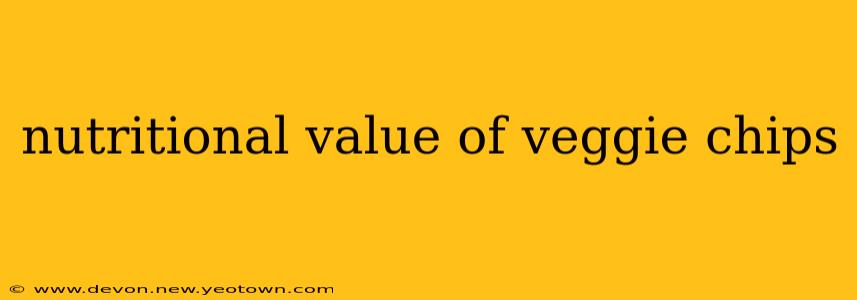The Crunchy Truth: Unveiling the Nutritional Value of Veggie Chips
Veggie chips have stormed the snack aisle, offering a seemingly healthier alternative to potato chips. But are these crunchy delights truly as nutritious as they claim? Let's delve into the world of veggie chips, exploring their nutritional profile and answering some burning questions. This isn't just about calories; we'll uncover the complex interplay of vitamins, minerals, and potential downsides.
My name is Alex, and I've been researching healthy eating habits for over a decade. I've seen firsthand the confusion surrounding processed foods, and I'm committed to providing clear, concise information to help you make informed choices.
What are the nutritional benefits of veggie chips?
The beauty of veggie chips lies in their potential to deliver a dose of vitamins and minerals, depending on the vegetable used. Think of sweet potato chips—they often boast a good source of beta-carotene, a precursor to Vitamin A, crucial for vision and immune function. Beetroot chips offer nitrates, potentially beneficial for blood pressure. Carrot chips contribute Vitamin C and fiber. However, the nutritional profile varies drastically depending on the vegetable and the processing method.
Are veggie chips a healthy snack?
This isn't a simple yes or no. While veggie chips can offer some nutritional advantages over traditional potato chips, they're often processed and may contain added oils, salt, and sometimes even sugar. The "health halo" effect can be misleading. A small serving of genuinely minimally processed veggie chips can be part of a balanced diet, but overconsumption can still lead to excess calories and sodium.
How many calories are in veggie chips?
Calorie counts vary widely. A serving size, typically around 1 ounce, can range from 100 to 150 calories or more, depending on the vegetable, added oils, and seasonings. Always check the nutrition label! The calorie density isn't necessarily lower than potato chips, so mindful portion control is vital.
What are the best types of veggie chips?
The "best" veggie chips are those that are minimally processed. Look for brands that use simple ingredients—the vegetable itself, perhaps a little sea salt, and minimal added oil. Avoid chips with long ingredient lists featuring unfamiliar additives, excessive sugar, or unhealthy fats. Read the labels carefully and compare different brands.
Are veggie chips better than potato chips?
In many instances, yes. Veggie chips often offer a higher concentration of vitamins, minerals, and fiber compared to potato chips. However, it's crucial to consider the processing method. Heavily processed veggie chips, loaded with salt and unhealthy fats, won't be significantly better than potato chips nutritionally. The key is to choose minimally processed options.
What are the potential drawbacks of eating veggie chips?
The biggest drawbacks stem from processing and added ingredients. Excessive salt intake can contribute to high blood pressure, and added oils can increase the calorie and fat content. Some brands also add sugar, which further diminishes the health benefits. Additionally, while veggie chips provide fiber, it's not always in the same abundance as eating the whole, unprocessed vegetable.
Can I make my own veggie chips at home?
Absolutely! Making your own veggie chips at home offers complete control over ingredients and processing. Simply slice your favorite vegetables thinly, toss with a little olive oil and seasonings, and bake until crispy. This approach minimizes added oils, salt, and sugar, resulting in a healthier and tastier snack.
In conclusion, the nutritional value of veggie chips is a spectrum. From a nutritional powerhouse to a calorie-laden snack, it all depends on the specific product and how it's prepared. By making informed choices and opting for minimally processed options, or even better, making your own, you can enjoy the crunch without compromising your health goals. Remember to always check the nutrition label and prioritize mindful portion control.

